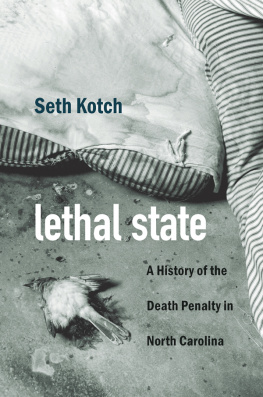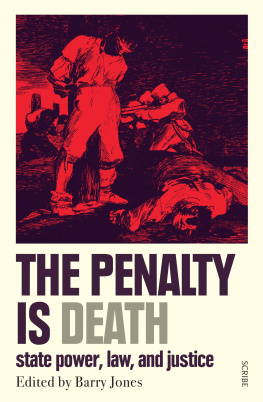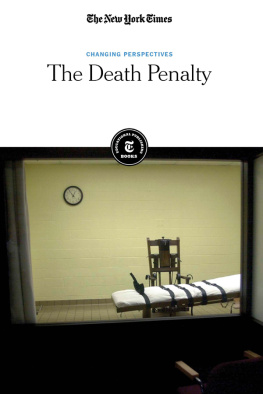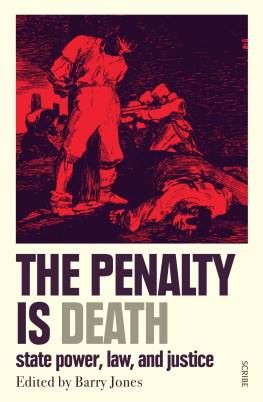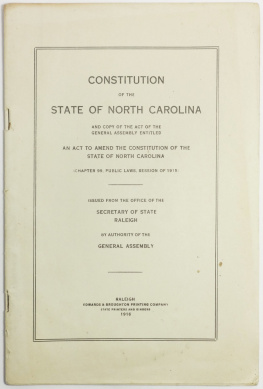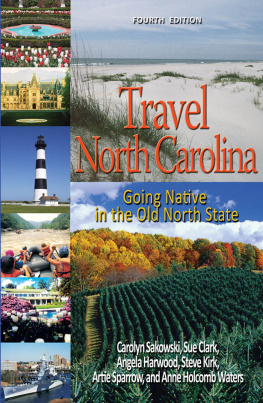Justice, Power, and Politics
COEDITORS
Heather Ann Thompson
Rhonda Y. Williams
EDITORIAL ADVISORY BOARD
Peniel E. Joseph
Matthew D. Lassiter
Daryl Maeda
Barbara Ransby
Vicki L. Ruiz
Marc Stein
The Justice, Power, and Politics series publishes new works in history that explore the myriad struggles for justice, battles for power, and shifts in politics that have shaped the United States over time. Through the lenses of justice, power, and politics, the series seeks to broaden scholarly debates about Americas past as well as to inform public discussions about its future.
More information on the series, including a complete list of books published, is available at http://justicepowerandpolitics.com/.
This book was published with the assistance of the H. Eugene and Lillian Youngs Lehman Fund of the University of North Carolina Press. A complete list of books published in the Lehman Series appears at the end of the book.
2019 Seth Kotch
All rights reserved
Set in Charis by Westchester Publishing Services
Manufactured in the United States of America
The University of North Carolina Press has been a member of the Green Press Initiative since 2003.
Library of Congress Cataloging-in-Publication Data
Names: Kotch, Seth, author.
Title: Lethal state : a history of the death penalty in North Carolina / Seth Kotch.
Other titles: Justice, power, and politics.
Description: Chapel Hill : University of North Carolina Press, [2019] | Series: Justice, Power, and Politics | Includes bibliographical references and index.
Identifiers: LCCN 2018021265| ISBN 9781469649863 (cloth : alk. paper) | ISBN 9781469649870 (pbk : alk. paper) | ISBN 9781469649887 (ebook)
Subjects: LCSH : Capital punishmentNorth CarolinaHistory20th century. | Capital punishmentNorth CarolinaHistory19th century. | Lynching. | North CarolinaRace relationsHistory20th century. | African AmericansCivil rightsHistory20th century.
Classification: LCC HV 8699. U 6 N 846 2019 | DDC 364.6609756dc23 LC record available at https://lccn.loc.gov/2018021265
Cover image (detail) by David Simonton.
Introduction
A History of the Present
Sunday morning, November 12, 1922, offered subscribers to the Raleigh News and Observer a range of informative and enlightening material. The first page featured stories of local and national Armistice Day celebrations; an interview with Benito Mussolini, who expressed his firm opposition to womens suffrage; and an account of a deadly earthquake and tidal wave in Chile. Turning the page, readers could take in the story of Carolina footballs narrow victory over the Virginia Military Institute, read columnist Nell Battle Lewiss celebration of messy bookcases, and learn how to get rid of their fat without diet or exerciseone free trial treatment waited to be claimed! Toward the back of the Sunday editions thirty-six pages was William Jennings Bryans weekly Bible talk, this one on 7 Luke, in which Jesus rebukes a Pharisee and tells a sinful woman, Thy sins are forgiven.
Forgiven, too, were the sins of the Confederacy. The paper reported on World War I and Civil War veterans parading through Raleigh and mingling at a barbecue where Josephus Daniels, the News and Observer s editor, called on them to heed the example of the sturdy faith and nobility of Robert E. Lee. Like North Carolina itself in the 1920s, the paper was thickly veined with mannerly white Christian supremacy. In refusing to look to the future without absolving the sins of the past, the News and Observer that Sunday captured what was by then the well-established dogma of Old South nostalgia and Confederate hero-making.
This hero-making drew in the Ku Klux Klan, resentful ex-Confederates and their hangers-on seeking to push back the gains of emancipation who were later reimagined in D. W. Griffiths Birth of a Nation as defenders of white southern civilization. In this vision, the Klan was not a loose guerilla army terrorizing formerly enslaved people, responsible for scores of lynchings and firebombings and whippings. Instead, they were champions of justice in an unfairly besieged region, resisting tyranny from without and threats from within. Opening their newspapers on this Sunday morning, News and Observer readers had a taste of this revision in the form of three solid columns celebrating the Ku Klux Klans defeat of carpet-bagism, scalawagism, and negro rule. The piece, like those sprinkled throughout the issue, justified and sanctified white violence, whether against people of color or against political rivals.
The author of this tribute was identified as Capt. J. J. Laughinghouse. Writing as the last surviving Reconstruction-era Klan member from his native Pitt County, John Joseph Laughinghouse declared of this victory, No great achievement in all history was ever accomplished for civilization and humanity. A great courage, a dauntless spirit, a manly mission and high ideals were the actuating principles of those ex-Confederates of the Ku Klux Klan.
Grimes inflicted violence and it was inflicted on him in turn. He complained that agitatorsthe pro-Union Red Strings? The Union League?burned down the watermill on Grimesland, as he called his farm, and they came after Laughinghouse, too, poisoning his well.
So it was a surprise to almost every one whenafter the first attempt ended in a mistrial and a second trial was held in JuneParker received a verdict of not guilty.
Laughinghouse missed his chance to demonstrate his merit after Grimess murder, and he did not forget Parker or what he had done. Parker was free, but his freedom didnt make him wise. He lived at a distance for years, but ultimately could neither stay away nor keep his mouth shut. Nearly eight years after Grimess murder in 1880, he made the fatal error of drinking too much and returning to town to boast that he had gotten away with murder. He was locked up for drunkenness and may have been asleep shortly after 2:00 A.M. , when the street lights suddenly went out. A small mob, perhaps ten or twelve men, entered the jail and confined the night watchman, an African American man, to a cell. Parker was carried outside and seemed only then to realize his peril. As he began shouting Murder! he was bound and gagged. Was Laughinghouse among the dozen men who kidnapped Parker and swiftly hanged him? The answer to that question now lives only in family lore.
What does this story have to do with the history of the death penalty in North Carolina? What does this meandering tale of the Confederacy, the Klan, murder, courtroom drama, and lynching have to do with the history of the death penalty in North Carolina? It is one small history of one death penalty, meted out belatedly and illegally. In being delayed and outside the strictures of the law it was in fact not unusual as far as death penalties went. But perhaps more directly, this small history flows into the larger history of the death penalty in this state. In 1909, Laughinghousean unreconstructed Klansman, lynch mob member, and lynching advocatewas appointed superintendent of the penitentiary system in North Carolina. As superintendent, he ran the prison system, from the camps and road crews, to the prison farms, to the States Prison, home to death row. In 1910, the first person was executed there under state authority. Laughinghouse was there to see the death penalty in North Carolina evolve from a local matter to a state institution.

